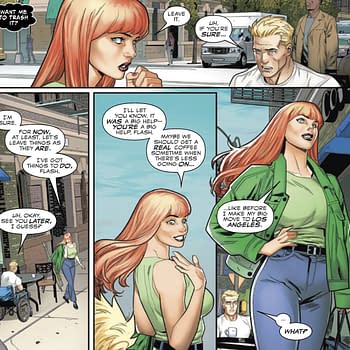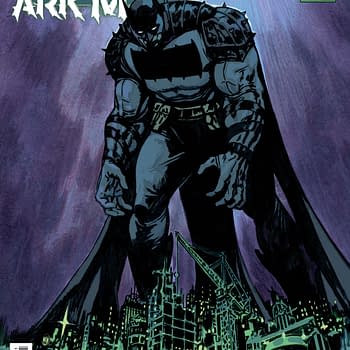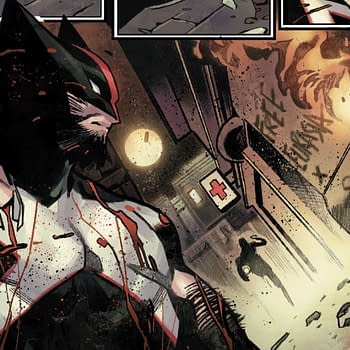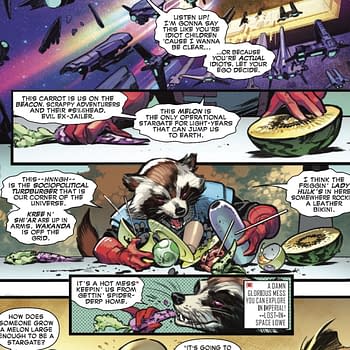Posted in: Comics | Tagged: Comics, king city, prophet
Brandon Graham – Manga In The Microwave

One of the most unlikely hits of 2012 has been Prophet — a revival of a 90s Rob Liefeld comic, written by an indie cartoonist who used to draw a comic about a boy and his drugged-up cat. Yet its writer, Brandon Graham, has a knack of turning the strangest of concepts into comics gold. Always swimming against the stream, he actively avoids traditional storytelling conventions and channels influences from weirdly wonderful foreign creators who often go overlooked in America. Not only does this set his work apart from most other titles on the shelf, but also forces us to rethink our preconceptions of what comics can do.
He is also an Olympic champion talker and what began as a brief chat at his booth at the Emerald City Comicon, turned into over an hour of reflecting on his career, working practices in the industry and the artists that we both admire. What follows are the edited highlights of a conversation with one of the most interesting cartoonists of his generation.
The King City collection is just out, and for a long time, it looked like we were never going to see that. Can you talk about the process of getting this collection published?
BG: Initially, Tokypop — the previous publisher before Image — they were translating a lot of Japanese and bringing it over to America. It's a funny story — we were actually going to visit them. I guess when they were getting the proofs from Japan, they weren't any better than the printed manga. So, what they were doing was microwave the finished books so that the glue melted, then pulling them apart and scanning those pages in. That's how they would translate the books. Their offices were in a skyscraper in LA, and they had an entire floor with a gigantic Tokyopop neon sign on the wall. When I went in, they showed me their microwaves — in their little lunch area — they had one for manga and, right next to it, they had a microwave for burritos or whatever. It was so strange to see all this money being thrown at this company, and this was just a little trashy — the trashy icing on the trashy cake. I guess it made sense to do it that way.
Before that, I was doing porn comics, and the concept of being able to do my own story and not have to compromise it with sex every five pages was really exciting, and also the idea that I would be making a living off of it… or at least enough money to get by, at least. So, I did a deal with Tokyopop. I remember signing the contract and I joked with them, "There, I signed your bad contract." And they said, "What's bad about it?" I was like, "It's not that great, but I understand…" and they were kind of offended… but uninterested in changing. But I didn't want to push it because I was so excited about the opportunity.

Right, it's almost a metaphor for your situation.
BG: Yeah, and I freaked out. Also, because they had done this to a lot of creators, they wouldn't talk to anyone, because everyone was just calling up to yell at them. So, I was really frustrated, and kept trying to get a hold of them, but they wouldn't talk to me about it. I had asked around – I went to everyone I know — and I had just met Joe Keatinge, who was working as a marketing guy at Image at the time. He was really friendly, and we were into the same stuff — I didn't think he could help me, but I asked him for some advice. He immediately put me in touch with Eric Stephenson — the head of Image — and they were just ready to move forward. They were just like, "We don't care about the rights — we're gonna help you get this published!" So, still trying to get a hold of Tokyopop, they still wouldn't talk to me, I eventually got so frustrated that I started putting King City online, serializing it myself. After that, they basically called me up on a conference call to yell at me, and I was like, "Wait, wait, wait — Image wants to talk!" So, they and Stephenson got into this negotiation that took about a year of constant back and forth to get the issues of the book into print.
I did about 70 pages of another comic while I was waiting for that to happen — this is Multiple Warheads — so there was this big break in King City. When it did eventually come out in single-issues, we were just thinking that that would be the end of it, and it was the most I could expect from it. I was really impressed by Image because I wasn't any kind of financial draw then — nobody knew my name — and they were spending a lot of time on me. It was really nice of them, and I couldn't figure it out. I think Stephenson just liked the book.
The issues came out and they did fairly well, and then we went back into negotiation for the trade collection, and it was another year of negotiation, pretty much. It just kind of magically happened! I was getting so frustrated, though. I would just start sending these emails that are like, "Come oooooon!" [Laughter] But it worked out, and Image managed to put out this gigantic trade of the whole thing and add French flaps and colour pages, and mark it down to just twenty bucks. And a lot of that money was just going to Tokyopop because they had to just pay them off first. I never planned on making money off King City past the original, so this was this almost like Image winking at me, saying, "Let's just make sure people buy the book." It's really exciting.
You said it was a bad contract with Tokyopop and I see that they're still mentioned on the trade — the book's listed as being copyrighted to them. After all this negotiation, how much of the property do they actually own?
BG: It's co-owned, I think it's about 60:40… whatever that means. They're basically just involved in this book…and I'm bad with contracts, obviously. The main thing that caught me up with them is that there's this stipulation in the contract that says about "print", and that they're allowed to put it on the Internet and call it "print". If I had changed that one thing in the contract, then I could have just waited a year and all the rights would have come back to me.
That sounds a lot like another contract that's been causing someone problems recently. [Laughter]
BG: Yeah, I didn't know what I was doing either. These days, actually, I don't know if it's the smartest thing, but I try not to sign any contracts. Like, with Prophet, there's no contract at all. I'm vaguely aware of the history of things like that, and what happened between Alan Moore and Liefeld. So, if the rug got pulled out from me tomorrow — I wouldn't like it, but I wouldn't be completely surprised. I always joke — a friend of mine was talking about how he wants to go work at DC, and I'm always like, "Have you not seen that they just shit on people at a certain point? Don't get really successful!" I try to be aware of that kind of stuff. Stephenson being involved gives me a lot of faith because he's really impressed with — even though I don't always like the books that Image publishes — with the way that they treat the creators and the way that they treat the work. It's just ideal.
Getting to the actual work itself in King City, then: How did you begin to conceptualise the series? It seems almost like the characters are secondary to the setting, and that the world you built was the most important element.
BG: Right. Well, initially I was trying to go to Vertigo. I was living in New York and basically, every week, I would try to go to Vertigo and pitch them different things. I've never in my life — and hopefully never again — had so many things rejected. I was talking to someone the other day who was totally broken-hearted, "I got a rejection!" And I was like, "Just one?" [Laughter] I don't remember how many I've gotten. There came a point where the one editor who was willing to talk to me quit Vertigo, and the porn publisher I was working for on the side were telling me, "We've got enough of your porn. It's not really selling that great, so we don't really need it." And I just hit a wall, and I didn't have anywhere to work for, or even a place to pitch my work to. I was so frustrated with the comics industry — and this was only my mid-twenties. I just remember being like, "Fuck comics — I hate these people! I want nothing to do with them." But I'm so tied to making comics, and so excited about making comics, that I began doing it completely for myself.
I began working at The Strand bookstore in Manhattan, unloading trucks and everything. That's when I started King City, only at the time it was called Cat Master. I just drew it entirely for myself. I drew the first 40 pages on my lunch breaks, not even planning, just doing it page-by-page. I remember I had a rule that I would tell myself, that if there was another element that didn't advance the plot, then that's what I needed to spend the most amount of time and pages on. If something advanved the plot, then I wanted to ignore that as much as possible and get it out the way.
The process of pitching something gets so soul-destroying, and I think it's damaging on the work because someone's always like, "What's the line that's going to sell this thing?" It's obviously not about what makes a comicbook good. It was an ideal thing for me to just start something out and just break away from the idea that anyone else would ever see it or care about it. I got about 40 pages done, and my friend Becky Cloonan was doing a book at Tokyopop and she introduced me to them, and it worked out that way.
The character of the Cat Master — originally, I had done a short story that I never finished about these terrorist guys called The Owls. They show up in King City, but in this story they were the heroes. It just started out with a guy walking around with a bucket of water, and he would grab cellphones out of businessmen's hands and throw them in the bucket of water. Then this gang — a bunch of owls — showed up and they were just terrorising Wall Street. I thought it was funny. The guy who showed-up to stop them was just going to be a guy in a business suit with a suitcase, and when he opens up the suitcase, it's just a cat, but he treats it like a sniper rifle. I tried to do some of that later in King City. I like the idea a lot, but I didn't like the idea of having just stiff James Bond characters, I wanted to have someone I could relate to more. So, I was trying to pass Joe through all these filters in my brain — I was really into the Buscema Conan at the time — so I was trying to do like a Conan guy, but I didn't want to make him big and muscular. So I took all the Conan out, and I didn't want to make him too smart… so I left the haircut. [Laughter]
Was Conan one of your visual points of reference? Were you trying to update that adventure story model to fit your own tastes?

Yeah, the book feels very free — very creatively liberated. Was there ever a worry that people wouldn't get it, and Tokyopop would tell you to rein that in and make it more conventional — put all the things that advance the plot back in?
BG: Actually, Tokyopop was doing that the whole time. I think that it pushed me to develop what King City was even more, because they would bring up these things like, "What's this character's motivation? What's this?" It just made me react the opposite direction. I always joke about this one thing when this guy called up — this is when it was getting really autobiographical — and he's just like, "What's Joe doing? The guy's a total loser! What's he going to do with his life? We need to give him an arc where he becomes a better person in the end." And I was thinking, "I'm not going to become a better person by the time I finish this book!" [Laughter] I think it's disingenuous to think that the characters have to change in 200 pages. It's cool if they do, and maybe there is some character change in that, but I certainly didn't want to force it.
In the second half of the book, I actually had a really good editor at Tokyopop, this guy Troy Lewter who had read the first one as an assistant editor, and then they moved him over. The first editor I had — whose name I never remember — was really difficult. I remember we got nominated for an Eisner and he didn't care. He was like, "Eisners won't sell books." But Troy was fantastic to work with because he had a different take on it, he was throwing these basic plot-points at me, and I came up with so many great ideas with him being like, "What about this?" and it gave me an understanding of what the reader might expect in a standard adventure story. Also, a fantastic thing is reading people's reaction to the book, and reviews, and what they expect to see next. I read some comment online where somebody said, "Oh, I can't wait to see where Cat Masters come from!" and it had never occurred to me to show that. So, I started the second half of the series with that because I was like, "Oh shit!" and I was really happy with that and it would never have come out of my own head.
With that idea of the world being so rich with so many possibilities, and with the way that the story ends, it would be a very easy thing for you to return to King City. Do you feel that that's a period in your life that's over now, and you won't come back to that world, though?
BG: Well, the rights are a mess, but I like the idea of coming back to King City. I mean, just to do it for myself a little bit, and I would have to show progression in the story. I've come up with a short story I want to do where it's just Joe, years later in the city, and to explore how the other characters have moved on, and he's dating one of the other Cat Master girls. There's a point where — if you've read Elf Quest — there's a point where Wendy Pini gets a little fan-fictiony with her own characters, where she has them going through all this strife, and then she does these books where they're really comfortable, and everyone has kids and they all love each other, and nothing bad happens. I was getting that a little way at the end of King City, and there's a page in the back where I just draw every character in the same room, hanging out and watching TV. I feel a little weird about it, but that's my fan fiction page where they're all happy and they're all friends now. So, I worry that I'd get a little like that if I did more of it, so I had to take some of the characters out and try to do a little autobiography again, and treat it that where I am in my life is where the characters are in their life.
I like stories having a beginning, a middle and an end. I mean, I think Usagi Yojimbo is a great comic, but I don't own many issues of it. I was saying to someone the other day that if there were 100 pages of Usagi Yojimbo, and that's all he did, then I'd own that — there'd be no question. But because there's such a constant influx of it, I'm like, "Aaahh, I can read it anytime." It almost lessens the value of each individual issue.
I think that's true, and because his work is so easy to dip in and out of, it almost feels like it's not going anywhere, and there's no need to catch every installment. But it's great cartooning and really entertaining, and it's almost because he's so consistently good that there's never any stand-out stories. So, I think you're right that, if you can't bring anything new to the story, or it just carries on indefinitely, it's better to move on. And you have moved on now. You're working on Prophet now for Image which has been getting great reviews, and it's selling really well. As a result, are you feeling a new type of pressure now in your work?
BG: The whole thing has been surprising to me, just to the extent that I kept expecting the rug to be pulled out from under me, but it keeps going well. I keep nudging forward in the way that I come up with all these ideas for stories, and my immediate reaction is always, "Well, there's no way they'll let me kill Supreme and let me use his organs to power spaceships." And I'll send an email to Liefeld, and he just writes, "AWESOME!!!! DO IT!!!!" [Laughter] And that's happened several times, where I think an idea is just fucking crazy and that they'll never let me do it, but they're completely supportive of everything. My friends got involved in it, like Farel Dalrymple, Simon Roy and Giannis Milonogiannis, and something I find incredibly flattering is that in the process of working on it, they've all told me off-handedly that it's more fun than they expected it to me. We're really enjoying ourselves, and we wouldn't have had the chance to just fuck around on something otherwise. We're all indie guys and we all do comics that are not adventure Conan comics, for the most part, but we're all a fan of that stuff. So, for us, it's a chance to do a straight-forward science fiction comic and not have all of it on our backs as our personal work, which is really freeing and really fun. It is fan fiction, in a way, of all the 70s and 80s stuff we grew up on.
The success of it is just pushing me to have more fun on it. There is an obligation, though, when a person enjoys a piece of work, that you have a relationship with the reader to not fuck them over, you know? It's like, "I'm going to make a comic that you're going to buy, and I would buy if I were a reader." I'm trying not to treat it like a job, and that's really freeing to have that mentality. The only obligation, or pressure is to not do bad work. It powers the machine — it's fueled by enthusiasm — which makes work so much easier to do.
You were saying that Liefeld has been really supportive of the project, but getting back to bad publishing practices — do you own any of this? Is this just work for hire?
BG: Well, I guess it's work for hire since I didn't sign any contract… because I'm a madman. My entire dealing with this is based off my relationship with Eric Stephenson and just having a lot of faith in how he's treated me in the past.

BG: Honestly, I don't care what they do with it. I'm getting a monthly pay-check off it, and it's paying my rent. I spend about a week of every month working on Prophet and it allows me to spend the rest of the month doing my own work on the side… well, really Prophet is my work on the side. It's a fantastic day job and I don't think of it as mine at all. We're putting a lot of work into it, and trying to come up with good ideas, but I kind of think ideas are disposable. It's just a chance to do something cool and fun. I want to have a positive attitude about being a little detached from it, and trying to work hard on it, but I'm happy to leave it behind when I'm done with it. I pay a lot of attention to what happens to comic artists when they get older and it's not a good scene for the most part. There are a couple of guys that have pulled it off really well and I'm really trying to aim for that and really try to understand what's going to happen with the work, and treat it a certain way and feel a certain way about it. I just want to enjoy it and not get bitter about things.
If Image were ever like, "We're kicking you off the book, and we're doing something else," and I don't think they will, but if that had to happen, I think they'd give me some warning. And if they did something I thought I was shitty after me, I wouldn't read it, but I wouldn't feel hurt by it.
Have you got much creative control over what goes on in the book? You were saying it's your friends who are illustrating it.
BG: Yeah, they've given me, basically, no restrictions. They don't like swearing, but I'm trying to talk them out of that. It's so far in the future, though, that I don't know if swear words even work. Like, I wanted someone to call someone a bastard in it, but if everyone's a clone and it's a robot saying it, then that word doesn't have any meaning anymore. But it's total freedom — I only hired people whose work I'm really enthusiastic about, who are into the same stuff as me. It's really fun because Farel came up to Vancouver and stayed a week at my place, and we just watched old Tom Baker Doctor Who and decided what would be exciting to put into a science fiction comic. I don't even tell Image a lot of stuff now — I just send them finished issues and they publish them. Liefeld or Stephenson might then email and say, "Good issue — thanks!" It's such a huge departure from mainstream comics — I know some guys who work in the mainstream — where everything checked and changed. We just throw in nonsense! In the last issue, Simon just drew a guy dressed like the old John Prophet — dead, with a sword through him — and it was just a throwaway thing, and it wasn't a big deal. But Liefeld reacted like we were showing the original guy dead, and we never thought of it that way, because we're still thinking of things to do with the original guy.
I do really like the back and forth with people who have read it, and discussing expectations. Prophet is the first thing I've done where there are actually mysteries in it. And I'm bad at keeping comicbook secrets — like, if someone comes up to me, I'll tell them all the plots of it and I'll accidentally say, "Oh, this happens…". It's weird because we've planned so far ahead that I know what's going to happen in 14 issues from now, which is where my head is at right now. So, when people talk about reading the third issue, it's just like, "Oh, that's just the start — we do this, and this, and this…" It's really fun. It's cool to see what people's expectations are, and to be able to bounce around from that.
Speaking of the old Prophet, Stephen Platt has recently got back into doing some comics work. He's one of these odd creators from the early 90s that have been reappraised and recontextualised by indie cartoonists. Have you got any plans to work with him on future issues?

In King City, a lot of the touchstones seemed to be manga that you had grown up liking, and in Prophet it seems to be more European cartooning — Heavy Metal stuff. When you're conceptualizing your work, are you trying to create some sort of history or context for yourself and how your generation of cartoonists can be understood?
BG: Yeah, that's a really important part of it for me. I feel that a lot of my comicbook heroes are unrepresented — the stuff that got me so excited about comics — I always see lists of "must read" comics, and there'll be nothing on there that I need. There's none of the stuff that completely changed my life on there — even if I enjoy some of the books. That's a big part of it, just coming from that place and talking about the work. There's this artist named Phil Barlow who, when I was 10, I got ahold of this six-issue series he did called Zooniverse. It changed my comicbook life, you know? It was so exciting, and he put so much work into these six issues that I've memorized the things pretty much. Showing it around and talking to people about his work and to have this guy, whose work I found so impressive, not be treated that I think he deserves really changes my opinion of popular opinion. It's cool that people like what they like, but I want what I like to be pushed forward more. I actually got in contact with the guy, and we've been talking a lot, and he did a back-up story in issue 22 of Prophet and, for me, it was huge to be able to deal with this guy and have him be so cool, and happy with his life. The great thing is that he's been working in animation for the past 15 years and he just quit to start getting into comics again. It's amazing! And also Frank Teran was another artist I was a big fan of, and I got in contact with him, and we got him to do a Prophet back-up… and he's quitting video games to come back to comics. The idea of not only inspiring people who are kids now, but also helping out the people who really excited me about comics — it's such an exciting place to be — it's amazing.
The next project that you're working on — that you mentioned before, briefly — is Multiple Warheads. Now, this is about a guy with a werewolf penis?
BG: Yeah… [Laughter] So, basically, when I was doing porn comics in New York, I would go in they would let me do whatever I wanted, as long as I had sex in it. They reined it in a little bit later, and said that I needed to do lesbian schoolgirls… which was an odd mandate to slam down on someone. But, before that, they just told me to make sure there was sex in it. It was right after 9/11, and New York was really bizarre then — there were soldiers with guns in the subway. So I just did this porn comic which was my reaction to that. It's just about a girl smuggling a werewolf's penis across a security checkpoint and sewing it onto her boyfriend. Then, he turns into a werewolf and they have sex. It was just a jokey, dumb comic. Then, later on, I thought it would be fun to go back to, and I keep coming back to it and trying to build this whole comic off of a 10-page porn thing I did… and make it serious. But it's still about a guy getting a werewolf's dick.
Werewolf penises, spacemen clones with tails, drugged-up cats that become weapons — it just seems that like everything you've done in your career, aside from maybe your porn work, you've never needed to compromise, or to answer editorial mandates. As an artist, I imagine that's very fulfilling, but have there been compromises you've had to make in your life outside of art?
BG: It was not a financially successful choice. I'm incredibly stubborn, and I think that I have that teenage stubbornness — and I've mellowed out in a lot of ways — but I'm still a little bit "fuck the man." In the beginning, I remember desperately trying — I mean, I've pitched Batman comics — I've tried, but it built up my resolve more and more with every rejection. Then it got to the point when I just decided I would do whatever I wanted. I think porn comics were the perfect training ground for me because I was allowed to do anything as long as it had the sex in it. I could work with that — I could have crazy stories and have fun without any editorial interference. It's allowed me to keep the work personal. I was on a panel yesterday and we were talking about Alex Toth, who is a fantastic artist, who did amazing work, but he spent his whole life doing work for other people. And he died without leaving much personal work, and I find that really sad. There are so many artists that do great, but they're not allowed to put themselves in it. So, I feel really fortunate that I have been able to get away with that at this point, and that I can do something like Prophet and not have any editorial interference, because people are used to me doing whatever I want now.













